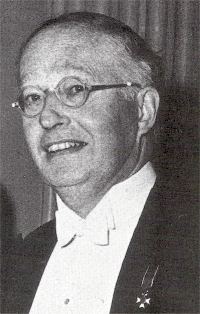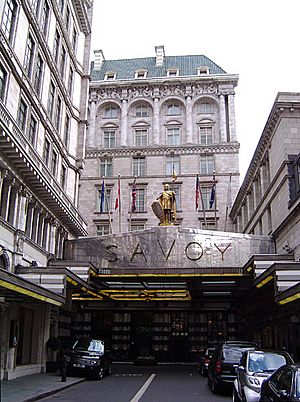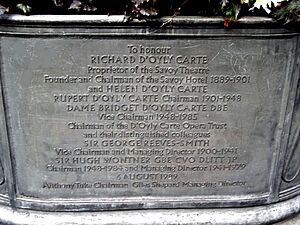Hugh Wontner facts for kids
Sir Hugh Walter Kingwell Wontner (1908–1992) was a famous English hotel manager and politician. He was in charge of the Savoy Hotel group for many years. He was the managing director from 1941 to 1979 and the chairman from 1948 to 1984. He also led the Savoy Theatre from 1948 until he passed away. In 1973 and 1974, he held the important role of Lord Mayor of London.
Wontner started working in the hotel industry at a young age. He helped the Savoy hotel group get through the tough times of World War II. After the war, he made sure the hotels became grand again. He also successfully stopped other companies from trying to buy the Savoy group. When the Savoy Theatre was destroyed by fire in 1990, he personally oversaw its rebuilding.
He was very involved in the City of London. He was a leader in two old guilds and served as an alderman and chief judge. He was given the title of Knight in 1972.
Contents
Biography of Sir Hugh Wontner
Early Life and Education
Hugh Wontner was born in 1908. His father was a well-known actor named Arthur Wontner. Hugh's original name was Hugh Walter Kingwell Wontner Smith, but his father changed the family name in 1909.
Hugh went to Oundle School in England and also studied in France. He later said he wasn't a very academic student. After working at a hotel in Paris, he joined the London Chamber of Commerce for several years. In 1933, when he was 25, he became the general secretary of the Hotels and Restaurants Association of Great Britain. In 1936, Wontner married Catherine Irvin, and they had two sons and one daughter.
Leading the Savoy Hotel Group
Wontner's work with the Hotels and Restaurants Association connected him with George Reeves-Smith, who was the managing director of the Savoy hotel group. Reeves-Smith was very impressed with Wontner's skills. He saw that Wontner had a good taste for wines, loved to travel, and was very passionate about the theatre.
In 1938, Reeves-Smith invited Wontner to join the Savoy group as his assistant. When Reeves-Smith died in 1941, Wontner, at just 32 years old, was chosen to be the managing director. The Savoy group included famous hotels like The Berkeley and Claridges, as well as the Savoy.
In 1948, the chairman of the Savoy, Rupert D'Oyly Carte, passed away. Wontner was then elected chairman, becoming the first person since the founder to hold both chairman and managing director roles. He remained managing director until 1979 and chairman until 1984. Later, he became the life president of the group.
The Savoy During World War II
When Wontner took over, World War II was happening. He and his team faced many challenges. There was bomb damage, food rationing, and not enough staff. At first, fewer people visited the hotels.
However, after the U.S. joined the war, business improved. The Savoy Hotel became a popular place for American officers, diplomats, and journalists. It was also a meeting spot for important war leaders like Lord Mountbatten and Charles de Gaulle. Wontner worked closely with the government to follow wartime rules, even helping to set limits on meal prices.
After the War: Restoring Grandeur
After the war, Wontner worked hard to bring the Savoy group back to its former glory. He invested a lot of money to fix war damage and improve the hotels. Under his leadership, Claridges became a home away from home for many world leaders, from President Tito to Gandhi. The Savoy attracted famous stars like Frank Sinatra and Sophia Loren, and was visited by British royalty.
Under Wontner, the group bought the Connaught Hotel in 1956. In the early 1960s, they decided to move the Berkeley Hotel to a new location, which opened in 1972. Wontner was careful about expanding the Savoy group to other countries. He wanted to make sure the high standards were kept. In 1970, he added the Lancaster Hotel in Paris to the group.
Protecting the Savoy Group
Sir Hugh Wontner was known for being smart and honest in business. He was also very determined. Under his leadership, the Savoy group successfully fought off several attempts by other companies to buy them. These attempts are called "takeover bids."
In 1953, a businessman named Charles Clore tried to buy the Savoy group. When his offer was turned down, he sold his shares to another developer. Wontner protected the company by temporarily moving ownership of one of their hotels to the staff pension fund. This stopped the takeover bid.
To prevent future attempts, Wontner created special shares in the company. These shares had many more votes than regular shares. Wontner and his allies held these special shares. This meant that even if another company bought most of the regular shares, they couldn't control the company. This strategy helped the Savoy group defeat later takeover bids from large companies like Trafalgar House and Trusthouse Forte.
One time, Charles Forte managed to buy 69% of the group's shares. But because of Wontner's special share structure, Forte only had 42% of the voting rights. This meant he couldn't take over the company. After stopping this final takeover bid, Wontner retired from his main roles and became the president of the Savoy group.
Other Interests and Awards
Wontner had many other interests. He was very involved in the City of London. He was the Master of two old Livery Companies (traditional guilds). He also served as an alderman and chief judge. In 1973–74, he became the Lord Mayor of London, a very important role.
He also advised the royal family on their catering at places like Buckingham Palace. In 1953, he was appointed Clerk of the Royal Kitchens, a role that hadn't existed for a long time.
Wontner loved the theatre, just like his father. He was on the board of trustees for the D'Oyly Carte Opera Company and a committee member for the Barbican Centre. He was proud to be part of the Old Stagers, England's oldest amateur drama group. He also had a strong connection to the Savoy Theatre. He was its chairman and managing director from 1948 until he died. When the theatre burned down in 1990, Wontner personally oversaw its reconstruction. He was very happy at the "topping-out" ceremony (when the highest part of the building is finished). He was looking forward to the theatre reopening in 1993, just days before he passed away.
Sir Hugh Wontner received many awards from different countries. He was made an Honorary Citizen of St Emilion in France and a Freeman of the Seychelles. He also received important orders and medals from Spain, Gabon, France, Zaire, Denmark, Malaysia, and Sweden. In Britain, he was given titles like Knight Bachelor in 1972 and Knight Grand Cross of the Order of the British Empire (GBE) in 1974.
Hugh Wontner died in London in 1992, at the age of 84.
See also
 | James Van Der Zee |
 | Alma Thomas |
 | Ellis Wilson |
 | Margaret Taylor-Burroughs |




